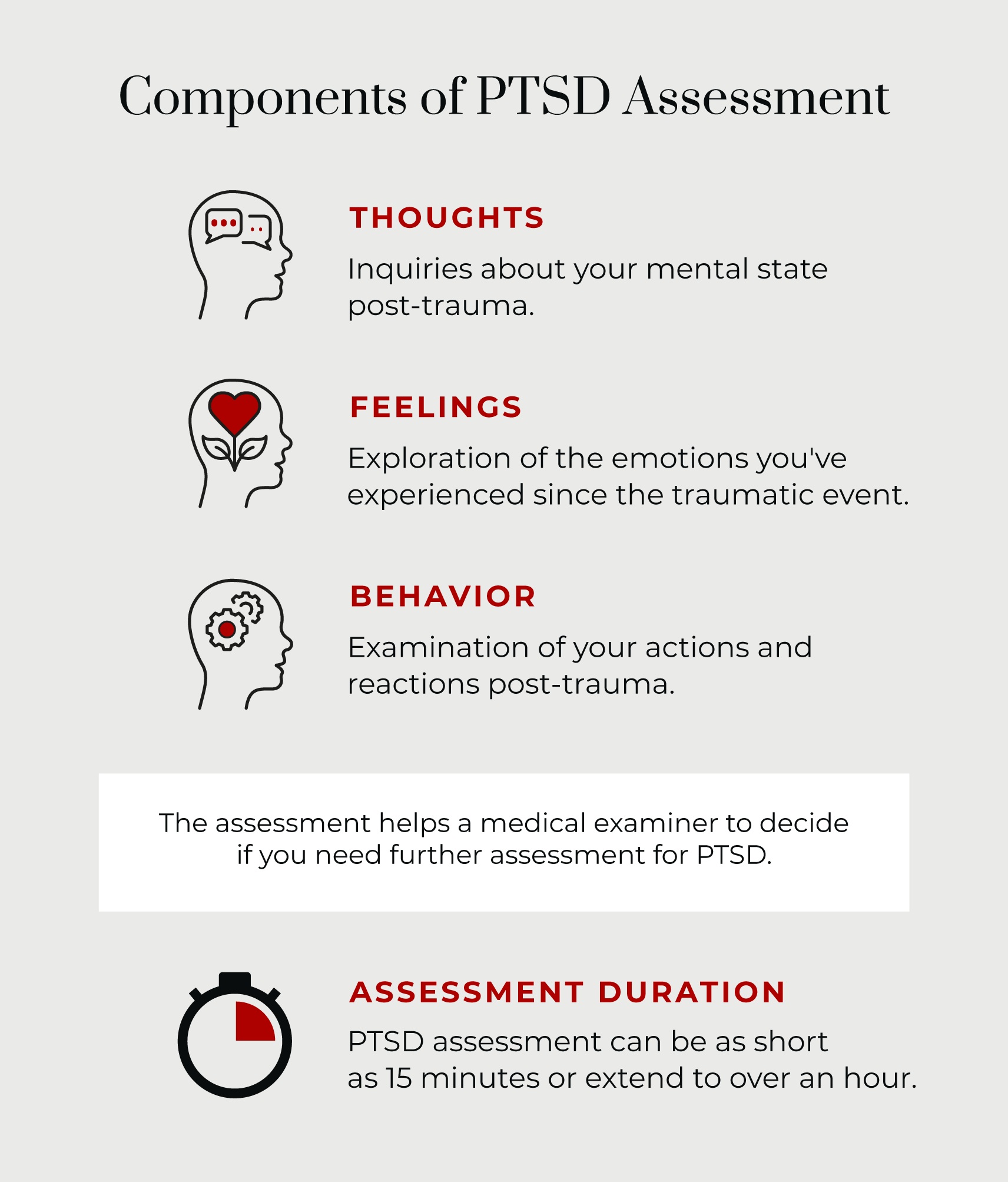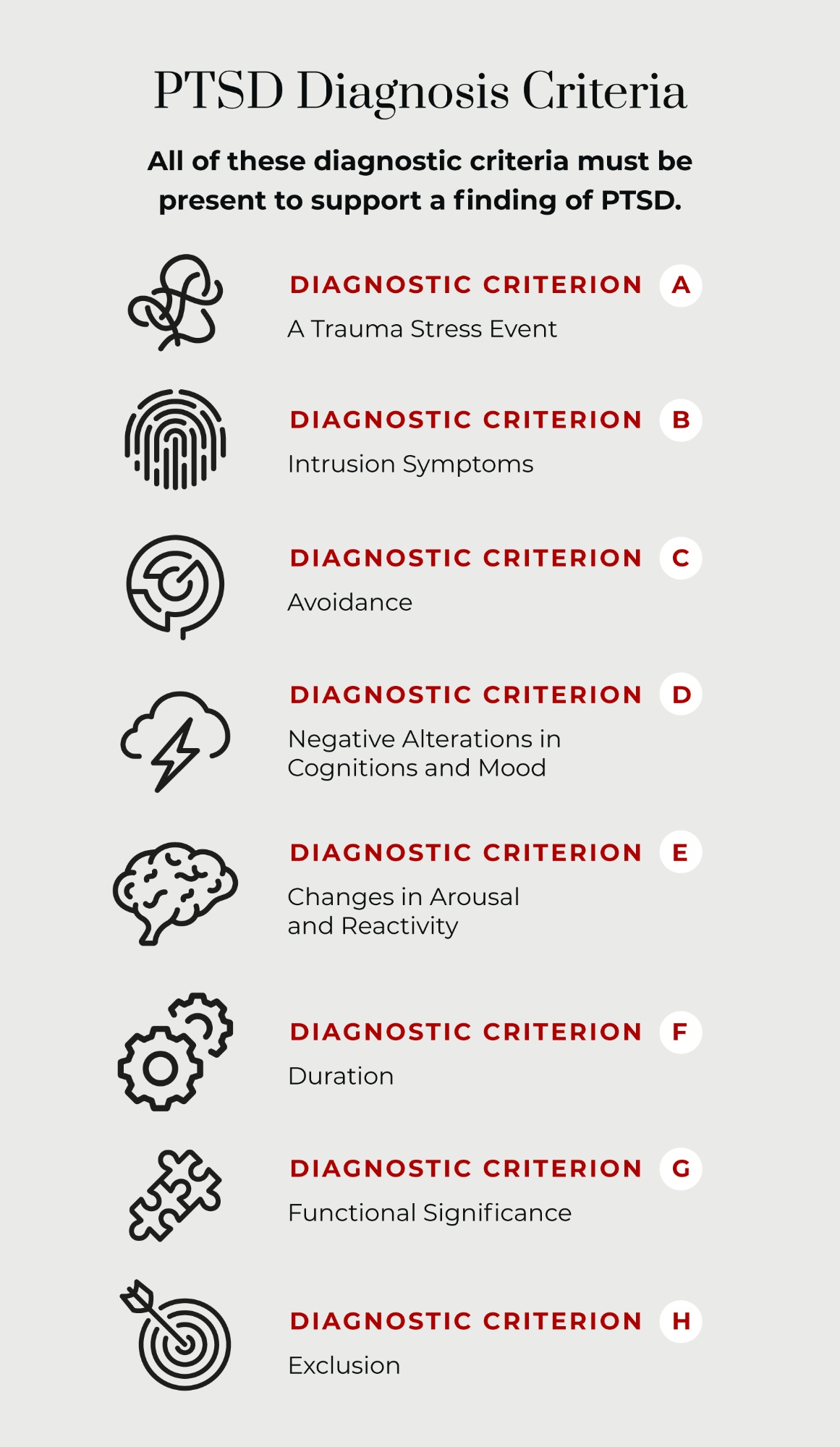Post-traumatic stress disorder (PTSD) is a psychological condition that the US Department of Veterans Affairs (the VA) recognizes as eligible for VA disability benefits.
Like all VA disability compensation, you must first show that you qualify for them. This often takes place during a PTSD screening and assessment that lead to a PTSD diagnosis, which can be part of your VA compensation and pension examination.
A VA benefits compensation lawyer from Stone Rose Law can help you to understand what PTSD is, its symptoms, how the VA calculates disability ratings for PTSD, and how to prepare your claim for PTSD service-related VA compensation benefits. If you believe you may be eligible for PTSD benefits from the VA, call us at (480) 498-8998 today to speak with one of our Arizona VA claims lawyers to arrange for a free consultation.
A PTSD assessment includes questions about your thoughts, feelings and behaviors since the traumatic event. The results of the assessment are not a diagnosis of PTSD in themselves. Instead, the assessment helps a medical examiner to decide if you need further assessment for PTSD.
The duration of your PTSD assessment can take as little as 15 minutes up to an hour or more.

To diagnose service-connected PTSD, the VA relies on the Fifth Edition of the American Psychiatric Association Revised Diagnostic and Statistical Manual, also known as the DSM-5. The APA DSM-5 Manual establishes the diagnostic criteria to diagnose PTSD as a traumatic or stressful event-related disorder.
PTSD symptoms manifest in four major symptom groups: intrusive or recurring symptoms, avoidance, alterations in your mood and cognition, and changes in your arousal and reactivity. Here, we cover the eight PTSD DSM-5 criteria used to identify PTSD in a military service veteran.
The DSM-5 Manual organizes these PTSD diagnostic criteria in alphabetical order from Criterion A through Criterion H. All of these diagnostic criteria must be present to support a finding of PTSD.

This criterion is for PTSD that comes from exposure to death, or to the threat of death, or from serious injury or actual or threatened sexual violence.
This traumatic or stressful event, threatened death experience, or sexual violence trauma can be based on direct exposure witnessing, or it can come from witnessing the traumatic event, or learning that a relative or close friend was exposed to it. In cases of actual or threatened death of a family member or friend, the event or events must have been violent or accidental.
In some cases, notably with first responders, repeated exposure to Criterion A trauma serious injury events is another recognized source of traumatic event exposure.
Under this criterion, your post traumatic stress disorder symptoms are based on remembering traumatic events after they have happened. These symptoms include recurring nightmares or recurring distressing recollections, flashback memories, and intense psychological or physical reactions to reminders of the traumatic event.
Symptoms of this criterion include avoidance behaviors. You might seek ways to stay away from stimuli that remind you of the traumatic event. These can include certain activities, or places, or situations, or conversations, or even some people.
This criterion requires you to experience at least two of the following negative alterations in your emotional or cognitive symptoms:
This criterion includes changes in your psychological or physiological reactions to stimulus events. You need to be suffering from at least two of the following:
This criterion applies if an underlying disturbance in DSM-5 criteria B through E lasts for more than one month.
This criterion covers disturbances that cause significant distress or impairment in your social, occupational, or other everyday life activities.
This criterion relates to symptoms you may have that are not caused by medications, use of substances, or another medical condition.
A dissociative specification in connection with this criterion means that in addition to meeting the criteria for PTSD, you are also experiencing high levels of dissociative symptoms, including:
A delayed specification is that, although immediate symptoms might manifest themselves, does not meet full diagnostic criteria for at least six months after the traumatic event.
There are many reasons why the VA might deny your VA benefits claim for PTSD. It could be based on insufficient medical evidence to meet all of the diagnostic criteria requirements, the lack of a specific PTSD diagnosis, or the lack of a nexus between your PTSD symptoms and your military service.
If the VA denies your post traumatic stress disorder benefits claim, all is not lost. Our veterans disability attorneys at Stone Rose Law have extensive experience successfully challenging all kinds of VA claim denials, including PTSD claim denials. We will work with the VA to learn exactly why your claim was denied, then work with you, your doctor, and with your military service and medical records to overcome the denial.
If need be, we will appeal your claim denial to the Board of Veterans Appeals.
Our mission is to help veterans like you to receive the VA disability compensation, VA mental health services, substance abuse treatment, and other VA care you need because of service-connected emotional distress or psychological disorders, including PTSD. Call us at our Phoenix office, (480) 498-8998, to get a free consultation. Or contact us online to talk with a Colorado VA disability lawyer today.